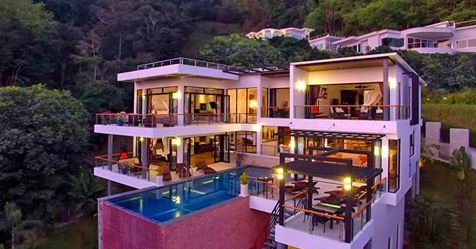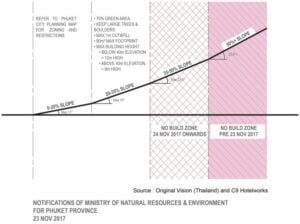Phuket’s new Environmental Rules hit island development

By Bill Barnett of c9hotelworks.com
A new set of guidelines that quietly come into law late last year are set to alter the state of real estate and hotel development in Phuket.
The revised regulations were issued by Thailand’s Ministry of Natural Resources and Environment and apply to Phuket Province.
Perhaps the most significant amendment is that buildings are no longer allowed on slopes of 35% incline and above, wherein in the past the threshold was 50%.
For slopes of 25-35% incline, rules now require 70% green area, limit cut and fill to one metre and requires that large boulders and trees (exceeding 500mm in girth) not be removed. This zone also limits building footprints to 90 square meters and for elevations below 40 meters restricts height to 40 meters and above 40 meters to six meters high.
Speaking to Phuket-based design and planning experts Original Vision (Thailand) the up side for the amended guidelines waves the IEE process for small hotel and property developments of 29 units/keys or less. Hence only a construction permit is required, but GFA cannot exceed 1,500 square metres.
An IEE (Initial Environmental Examination) is still required for property or hotel projects of 30 units/keys or those that fall within a development GFA of 1,500 to 4,000 square metres.
The more complex EIA (Environmental Impact Assessment) process is still required when exceeding 80 units or keys and an area above, 4,000 square metres in GFA.

What is important to understand is that the new regulations also must be referenced to the Phuket City Plan and Provincial set-back rules. Locations continue to have an overlay, and there are area specific regulations in Phuket City, some areas in Patong and nuances between the West and East coast.
It is clear that the new regulations are a more determined focus by the Thai government on slope control and green areas which looks to create a more challenging regime for property and hotels developers in land parcels that have significant terrain.
For any prospective developers out there, we strongly suggest obtaining a professional opinion on the revised regulations and how they may affect any prospective plans that have not been submitted for approvals.
As to who are the winners and losers for development? Hillside condominium projects certainly will become more difficult as will cliff hugging hotels. While smaller boutique projects now have an advantage of no IEE processes. End of the day, Phuket is a winner with greater focus on badly needed environmental protection.
Latest Thailand News
Follow The Thaiger on Google News:


























